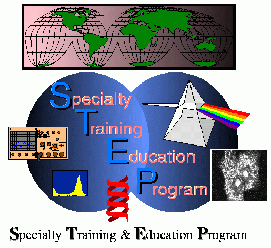


[Introduction to STEP]
[Specialty Areas]
[STEP Committee Members]
[Search for Keyword]
Chromosome Studies
Data Analysis
National Flow Cytometry Resource (NFCR) University of California Los Alamos National Laboratory Los Alamos, New Mexico 87545Laboratory Profile
Head: Jim Jett, Ph.D., NFCR
Scott Cram, Ph.D., Chromosome Studies
1. Facilities: 2000 square foot facility dedicated to chromosome analysis and sorting, a general tissue culture laboratory for chromosome isolation and staining, computer facilities, office and laboratory space for visiting scientists.
2. Instrumentation:
Flow cytometry: Two flow cytometers (an EPICS V and an EPICS 752; each equipped with two 5 watt argon ion lasers) dedicated to chromosome analysis and sorting. An optical sorter is under construction for high speed chromosome sorting.
Other major items: A complete chromosome imaging laboratory is available and includes a Zeiss LSM confocal microscope, a Zeiss Axiophot with a cooled CCD and interchangeable ICCD detectors, and several state-of-the-art image processing and analysis software packages. A fluorolog 102, SPEX spectrofluorometer is available for fluorescence spectral analysis.
Computers and analytical capabilities: Flow cytometers are linked via ether link to a MICRO VAX system (configured as a VAX cluster) for data analysis. Los Alamos houses one of the largest computing centers in the world that is accessible via a Laboratory-wide network.
3. Specialization Areas: Chromosomes are isolated from a wide variety of species including human, mouse, Chinese hamster, rat, and others. Procedures are available for isolating chromosomes from primary material, cell strains, and cell lines. Specialized procedures compatible with small and large vector cloning are available. Associated procedures for reverse chromosome painting and cloning are extant.
4. Special Opportunities: The National Flow Cytometry Resource and the Maine Medical Center Research Institute present a yearly flow cytometry training course in either Los Alamos or at Bowdoin College, Maine.
5. Special Courses Offered: Specialized training is available for in-depth chromosome sorting and analysis procedures.
6. Graduate Program: Graduate research and limited course work is available in Los Alamos. Thesis research is commonly conducted at Los Alamos by special arrangements with faculty at the degree-granting institution.
7. Local Accommodations: Local motels and bed and breakfast establishments provide comfortable and affordable accommodations. Local transportation is limited but one motel is within walking distance of the laboratory.
8. Transportation: Los Alamos is served by Albuquerque International Airport (ABQ) and Ross Airlines, which flies into Los Alamos about every two hours on weekdays. Flying time from Albuquerque is 25 minutes and driving time is 2 hours (110 miles).
9. Cost of Internship: For collaborative projects and short duration specialized training, most laboratory-incurred costs are supported by the National Flow Cytometry Resource (NIH and DOE supported).
10. Communication:
James H. Jett, Ph.D. Director, National Flow Cytometry Resource Life Sciences Division Los Alamos National Laboratory Los Alamos, New Mexico 87545 Phone: (505) 667-3843 FAX: (505) 667-3024 E-mail: jett@lanl.gov L. Scott Cram, Ph.D. Life Sciences Division Los Alamos National Laboratory Los Alamos, New Mexico 87545 Phone: (505) 667-2890 FAX: (505) 667-2891 E-mail: cram@telomere.lanl.gov[Introduction to STEP] [Specialty Areas] [STEP Committee Members] [Search for Keyword]
